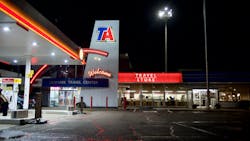BP Products North America has an agreement to purchase major truck stop chain TravelCenters of America for $1.3 billion. TA shareholders and regulators still need to OK the deal.
"Subject to approvals, we look forward to welcoming the TA team to BP," Dave Lawler, chairman and president of BP America, said. "TA's amazing nationwide network of on-highway locations combined with BP's more than 8,000 off-highway locations have the potential to offer travelers and professional drivers a seamless experience for decades to come."
See also: Top 15 truck stops in the U.S.
The acquisition would include 280 TA locations spread out among 44 states nationwide. TA locations offer passenger and commercial vehicle facilities, including more than 600 full-service and quick-service restaurants, truck maintenance, and repair services. In addition, its convenience services business generates around 70% of TA's total gross margin, almost double BP's global convenience gross margin.
According to BP: "TA's strategically-located network of highway sites complements bp's existing predominantly off-highway convenience and mobility business, enabling TA and bp to offer fleets a seamless nationwide service."
The oil marketer also noted its "global scale and reach will, over time, bring advantages in fuel and biofuel supply as well as convenience offers for consumers."
It said that includes a future for electric vehicle charging, biofuels, renewable natural gas, and eventually hydrogen for commercial and passenger vehicles. In the next seven years, BP plans to invest $23 to $33 billion into convenience, bioenergy, and EV charging. It has set aside $1 billion to spend on EV charging infrastructure by 2030.
"This is BP's strategy in action. We are doing exactly what we said we would, leaning into our transition growth engines," BP CEO Bernard Looney said. "This deal will grow our convenience and mobility footprint across the US and grow earnings with attractive returns. Over time, it will allow us to advance four of our five strategic transition growth engines. By enabling growth in EV charging, biofuels, and RNG, and later hydrogen, we can help our customers decarbonize their fleets. It's a compelling combination."
About the Author
FleetOwner Staff
Our Editorial Team
Kevin Jones, Editorial Director, Commercial Vehicle Group
Josh Fisher, Editor-in-Chief
Jade Brasher, Senior Editor
Jeremy Wolfe, Editor
Jenna Hume, Digital Editor
Eric Van Egeren, Art Director
